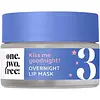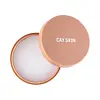What's inside
What's inside
 Key Ingredients
Key Ingredients

 Benefits
Benefits

 Concerns
Concerns

No concerns
 Ingredients Side-by-side
Ingredients Side-by-side

Hydrogenated Poly(C6-14 Olefin)
EmollientPolybutene
Octyldodecanol
EmollientCandelilla Cera
EmollientEuphorbia Cerifera Wax
Hydrogenated Castor Oil
EmollientHydrogenated Styrene/Isoprene Copolymer
Dicalcium Phosphate
AbrasiveCI 77891
Cosmetic ColorantAroma
Ricinus Communis Seed Oil
MaskingPseudozyma Epicola/Olive Fruit Oil Ferment Filtrate
HumectantTocopherol
AntioxidantHelianthus Annuus Seed Oil
EmollientPentaerythrityl Tetra-Di-T-Butyl Hydroxyhydrocinnamate
AntioxidantPolyhydroxystearic Acid
EmulsifyingHydrogenated Poly(C6-14 Olefin), Polybutene, Octyldodecanol, Candelilla Cera, Euphorbia Cerifera Wax, Hydrogenated Castor Oil, Hydrogenated Styrene/Isoprene Copolymer, Dicalcium Phosphate, CI 77891, Aroma, Ricinus Communis Seed Oil, Pseudozyma Epicola/Olive Fruit Oil Ferment Filtrate, Tocopherol, Helianthus Annuus Seed Oil, Pentaerythrityl Tetra-Di-T-Butyl Hydroxyhydrocinnamate, Polyhydroxystearic Acid
Polybutene
Hydrogenated Polyisobutene
EmollientDiisostearyl Malate
EmollientDipentaerythrityl Tetrahydroxystearate/Tetraisostearate
Skin ConditioningSynthetic Beeswax
Emulsion StabilisingGlyceryl Behenate/Eicosadioate
EmollientSynthetic Wax
AbrasivePhytosteryl/Isostearyl/Cetyl/Stearyl/Behenyl Dimer Dilinoleate
Skin ConditioningButyrospermum Parkii Butter
Skin ConditioningSilica Silylate
EmollientHelianthus Annuus Seed Oil
EmollientVanillin
MaskingPhytosteryl/Octyldodecyl Lauroyl Glutamate
Skin ConditioningIsostearyl Alcohol
EmollientBoron Nitride
AbsorbentSorbitan Sesquioleate
EmulsifyingAloe Barbadensis Leaf Extract
EmollientCalendula Officinalis Extract
Skin ConditioningTocopheryl Acetate
AntioxidantMalic Acid
BufferingWater
Skin ConditioningRicinus Communis Seed Oil
MaskingSodium Hyaluronate
HumectantPanthenol
Skin ConditioningHydrogenated Castor Oil
EmollientTocopherol
AntioxidantChondrus Crispus Extract
Skin ConditioningHibiscus Sabdariffa Flower Extract
Skin ConditioningHydrolyzed Chondrus Crispus Extract
Skin ConditioningMoringa Oleifera Seed Extract
Skin ConditioningCitric Acid
BufferingPolybutene, Hydrogenated Polyisobutene, Diisostearyl Malate, Dipentaerythrityl Tetrahydroxystearate/Tetraisostearate, Synthetic Beeswax, Glyceryl Behenate/Eicosadioate, Synthetic Wax, Phytosteryl/Isostearyl/Cetyl/Stearyl/Behenyl Dimer Dilinoleate, Butyrospermum Parkii Butter, Silica Silylate, Helianthus Annuus Seed Oil, Vanillin, Phytosteryl/Octyldodecyl Lauroyl Glutamate, Isostearyl Alcohol, Boron Nitride, Sorbitan Sesquioleate, Aloe Barbadensis Leaf Extract, Calendula Officinalis Extract, Tocopheryl Acetate, Malic Acid, Water, Ricinus Communis Seed Oil, Sodium Hyaluronate, Panthenol, Hydrogenated Castor Oil, Tocopherol, Chondrus Crispus Extract, Hibiscus Sabdariffa Flower Extract, Hydrolyzed Chondrus Crispus Extract, Moringa Oleifera Seed Extract, Citric Acid
Ingredients Explained
These ingredients are found in both products.
Ingredients higher up in an ingredient list are typically present in a larger amount.
Helianthus Annuus Seed Oil is the oil derived from the seeds of a Sunflower. Sunflower seed oil is non-fragrant. It is an emollient, meaning it helps to soften the skin.
Sunflower seed oil contains many fatty acids. The fatty acids found in sunflower seeds include (from highest amount to least): linoleic acid, myristic acid, palmitic acid, stearic acid, arachidic acid, oleic acid, and linolenic acid.
These fatty acids help the skin create ceramides. Ceramides play a role in repairing the skin barrier.
Helianthus Annuus Seed Oil helps moisturize the skin. This in turn helps the skin look more rejuvenated and smoother.
Sunflowers are rich in vitamin E.
Historians believe Indigenous cultures of North America domesticated sunflowers before corn. Thus they relied on sunflower oil for a variety of uses. One such use is moisturizing skin and hair.
Sunflower seed oil may not be fungal acne safe. We recommend speaking with a professional if you have any concerns.
Learn more about Helianthus Annuus Seed OilHydrogenated Castor Oil is created by adding hydrogen to castor oil. This helps stabilize the castor oil and raises the melting point. At room temperature, hydrogenated castor oil is solid.
Castor Oil helps moisturize the skin. It is rich in a fatty acid called ricinoleic acid. This fatty acid helps prevent moisture loss on the skin. This helps keep your skin soft and hydrated. Ricinoleic acid also has anti-inflammatory and pain reducing properties.
As a wax-like substance, Hydrogenated Castor Oil acts as an emollient. Emollients help keep your skin stay soft and smooth by creating a barrier. This barrier helps trap moisture.
Hydrogenated Castor Oil may not be fungal-acne safe. We recommend speaking with a professional.
Learn more about Hydrogenated Castor OilPolybutene is used to help control the viscosity of a product. This just means it helps adjusts the texture.
It is a polymer and does not get absorbed into the skin due to its large size.
Studies found this ingredient did not irritate skin in concentrations below 15%.
Learn more about PolybuteneRicinus Communis Seed Oil is the INCI name for castor oil.
Castor Oil helps moisturize the skin. It is rich in a fatty acid called ricinoleic acid. This fatty acid helps prevent moisture loss on the skin. This helps keep your skin soft and hydrated. Ricinoleic acid also has anti-inflammatory and pain reducing properties.
Besides hydrating the skin, castor oil is also used to hydrate hair. By keeping the hair shaft moisturized, breakage is decreased. More studies are needed to show castor oil's effective on stimulating hair growth.
Castor oil is created by cold-pressing castor seeds and then purifying the oil with heat. It was used in Ancient Egypt as fuel in lamps and to help treat eye irritation.
The term 'fragrance' is not regulated in many countries. In many cases, it is up to the brand to define this term. For instance, many brands choose to label themselves as "fragrance-free" because they are not using synthetic fragrances. However, their products may still contain ingredients such as essential oils that are considered a fragrance.
Learn more about Ricinus Communis Seed OilTocopherol (also known as Vitamin E) is a common antioxidant used to help protect the skin from free-radicals and strengthen the skin barrier. It's also fat soluble - this means our skin is great at absorbing it.
Vitamin E also helps keep your natural skin lipids healthy. Your lipid skin barrier naturally consists of lipids, ceramides, and fatty acids. Vitamin E offers extra protection for your skin’s lipid barrier, keeping your skin healthy and nourished.
Another benefit is a bit of UV protection. Vitamin E helps reduce the damage caused by UVB rays. (It should not replace your sunscreen). Combining it with Vitamin C can decrease sunburned cells and hyperpigmentation after UV exposure.
You might have noticed Vitamin E + C often paired together. This is because it is great at stabilizing Vitamin C. Using the two together helps increase the effectiveness of both ingredients.
There are often claims that Vitamin E can reduce/prevent scarring, but these claims haven't been confirmed by scientific research.
Learn more about Tocopherol